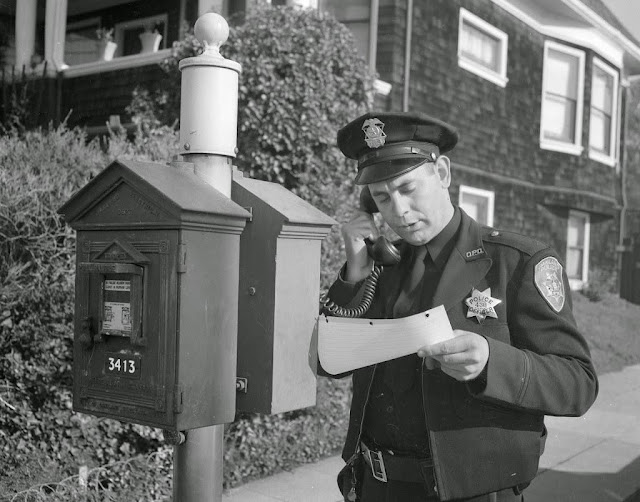Internal Resistance to Police "Real Time Crime Centers"
 |
| In 1959, this was as "real time" as it got! (Oakland CA PD) |
Right now, US police departments are being categorized according to whether or not the Department adopts a certain technological concept.
That concept is the Real Time Crime Center. And it's disrupted policing as we knew it.
The RTCC concept can be as formal & robust as a dedicated, fully staffed monitoring room... or as casual as an extra computer workstation in a tucked-away cubicle. The concept remains: Provide immediate "real time" support to cops & first responders on the street, through a latticework of technology, intelligence, sensors, & alerts.
RTCCs have been around for years. But 2021-2022 has seen unbelievable growth. Yet many police departments are resisting their implementation.
Why? I'll offer several opinions.
1. They cost money. However, I'll suggest that almost every RTCC started out with humble beginnings & have grown into the formal programs we now see in trade journals. There is no need to start big.
2. They upset established information functions, such as dispatch/communications & intelligence. RTCCs disrupt the operational tempos of these units, as well as blur the lines that previously distinguished & separated their functions. RTCC implementation calls for a redesign & re-invention of these roles.
3. Philosophy. RTCCs work their best when they support proactive enforcement efforts. For a multitude of reasons, many police departments have shunned away from going after crime, taking on a reactive posture. For these agencies who resist aggressive policing, RTCCs would be trying to help with a strategy the agency is no longer pursuing.
4. The unknown. Some police executives simply do not understand how RTCCs work, how they can help, the technology that is included, or where to even begin. TO be fair, the technology is advancing faster than even the seasoned RTCC operator can comprehend!
5. Low Crime areas. Some jurisdictions that do not suffer from high crime or violent crimes do not see the return-on-investment of an RTCC. Politicians see the concept as only applying to high-volume crime urban agencies. They don't envision RTCC use for non-violent crime applications.
I'm seeing this divide firsthand. I've been witnessing relatively low crime suburban police agencies making phenomenal arrests, preventing & disrupting in-progress crimes, & building solid cases -- all through the support of RTCC functions. The officers in these departments with RTCC commitments tend to have a better grasp of crime patterns, better situational awareness of what crimes are occurring in neighboring jurisdictions, & have a greater sense of purpose in today's law enforcement environment.
We are coming up on a point in time where to not have access to RTCC capabilities will be deemed negligent, if not reckless.
Start small. Start now.
Hit me up. I'm not in bed with any vendor. I have no financial skin-in-the-game.
I just believe in the concept.
***
Lou Hayes, Jr. is a detective supervisor in a suburban Chicago police department. He's focused on multi-jurisdictional crime patterns & intelligence, through organic working groups compromised of investigators & analysts from a variety of agencies. With a passion for training, he studies human performance, decision-making, creativity, emotional intelligence, & adaptability. In 2021, he went back to college (remotely!), in hopes to finally finish his undergrad degree from the University of Illinois - Gies College of Business. Follow Lou on LinkedIn, & also the LinkedIn page for The Illinois Model. ***




Comments
Post a Comment